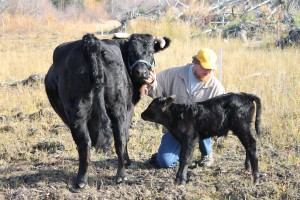Farming: It's not just in the country anymore
October 11, 2011
907-474-5042
10/11/2011
Urban farms are all the rage from Denver to Minneapolis and points beyond. Not to be outdone, the small town an hourŌĆÖs drive south of Fairbanks is home to the Nenana Urban Farm.
David Poppe and Kat McElroy live right in the heart of Nenana alongside their cattle, geese, chickens, turkeys and pigs. Poppe was raised on a dairy farm in Iowa, he fell into this new enterprise. McElroy hales from the casino culture of Nevada ŌĆ£where we raised nothing in the alkali desert.ŌĆØ
In 2005 Poppe gave McElroy the book, ŌĆ£OmnivoreŌĆÖs DilemmaŌĆØ by Michael Pollan, as a Christmas present. ŌĆ£It got us talking about where food comes from,ŌĆØ Poppe said.
After next devouring ŌĆ£You Can FarmŌĆØ by Joel Salatin, Poppe decided the time was right. ŌĆ£Everybody thinks they have to have a lot of land,ŌĆØ he said. ŌĆ£Just start. We were inspired to start with what we had.ŌĆØ They carved out a strip of garden that produces an abundance of vegetables, including sweet corn, artichokes and asparagus.
Soon after Poppe and McElroy decided to start growing their own food, livestock were at home not on the range but on seven city lots. ŌĆ£We didnŌĆÖt have a plan,ŌĆØ Poppe said. ŌĆ£We are just feeling our way through and learning from experience.ŌĆØ

The farm supplies meat and eggs to customers, as well as milk shares (people buy a share of the cow and receive a portion of milk). Shareholders are so thrilled to get their fresh dairy that one customer literally does a little dance when she gets the milk, Poppe said. For their own use, Poppe and McElroy are having a ball making cheese, yogurt, buttermilk and kefir.
Their first cow, Clara, purchased six years ago, had a very difficult time getting pregnant. They tried everything they could to get the population growing. Now the farm has its own bull. ŌĆ£WeŌĆÖre hoping he behaves himself,ŌĆØ Poppe said.
Neighbors have accepted the farm. Students from the nearby Nenana Living Center and families stop by to gawk at the animals. ŌĆ£We get toured quite a bit,ŌĆØ Poppe said. ŌĆ£ItŌĆÖs a novelty having large livestock in the city.ŌĆØ
One part of the success has been that Poppe keeps a close eye on the critters. ŌĆ£If they were out destroying property IŌĆÖm sure weŌĆÖd be frowned upon,ŌĆØ he said. Another part has been the ability to harvest hay on other peopleŌĆÖs property. He found the mother lode at the community airport, garnering 400 bales of hay this summer. ŌĆ£IŌĆÖm making use of local resources,ŌĆØ he said.
The hay is a mix of grasses, such as red top, brome, fireweed, dandelions, sweet clover and vetch. ŌĆ£The animals like the variety,ŌĆØ Poppe said. Contrary to most advice, Poppe does not feed the cattle much grain but supplements their diet with kelp meal. ŌĆ£People say they are the best looking cows theyŌĆÖve ever seen,ŌĆØ he said.
An innovative strategy has been pasturing cows where people want their grass mowed. Poppe puts up a moveable electric fence and wa-la a mini-farm is born. He even positioned three dry cows for the summer at a senior housing facility where the elders could observe the animals.
On a Sept. 27 visit to Nenana, this writer accompanied Poppe to check on a cow (the original one, Clara) that had been pastured down the road from the farm. When Clara got up to greet Poppe there was a healthy young bull that had been born that morning. ŌĆ£We were hoping this would happen today,ŌĆØ Poppe fairly beamed.
For the past 15 years Poppe has driven school buses and tour buses but this year he is determined to make a go on the farm. ŌĆ£I have to figure out how to get more streamlined so itŌĆÖs not so labor intensive,ŌĆØ he said. The farm isnŌĆÖt self-sufficient yet because barley still has to be purchased. ŌĆ£But the animals are paying their way,ŌĆØ he said.
ŌĆ£This is taking me back to my roots,ŌĆØ he said. ŌĆ£One thing I get a lot of pleasure from is watching the cows eat. It does something for me.ŌĆØ To him caring for cows is easier than most animals, including his sled dogs. ŌĆ£You water and feed them; you have to milk them twice a day and keep them clean.ŌĆØ Amazingly, he raises the Dexter and Galloway breeds without benefit of a barn.
ŌĆ£HeŌĆÖs the cow whisperer,ŌĆØ McElroy said. At night if Poppe hears one of the animals making noise he knows exactly which one it is and what is wrong, she said.
Poppe is pleased at the timing of his enterprise. ŌĆ£ThereŌĆÖs an appreciation for slow food now and we find people to share with,ŌĆØ Poppe said.
Contact: Nenana Urban Farm
This column is provided as a service by the ąįė¹╔ń School of Natural Resources and Agricultural Sciences and the Agricultural and Forestry Experiment Station.


